When you buy something in plastic, producers should have a triangle with a number inside it. This indicates what type of plastic this is, and helps organisations like ours who deal with waste and recycling, to determine what is recyclable and what isn’t.
It can be really hard to tell from holding an item what it’s made of, and we know that can make recycling very confusing- but we love that you’ve come to this page to find out how to do the right thing.
We’re really proud to let you know that the significant portion of what you put in your recycling bin is recycled right here in NZ, and some of it here in the Manawatu-Whanganui Region
In the past, our mixed plastics have been recycled overseas, but currently no one is taking this type of plastic. We’ve been continuing to collect this recycling and have been storing it at the Awapuni Resource Recovery Centre. You can read more about this on our Recycling Changes page.
Here you will get a brief explanation of what the numbers are, what plastic materials they are, and what common items you use might be made of them. It also says where they currently go once we’ve emptied your wheelie bin.
Glass that once contained food or drink, aluminium, tin, paper and cardboard are all sorted at the Awapuni Resource Recovery Centre and recycled here in NZ.
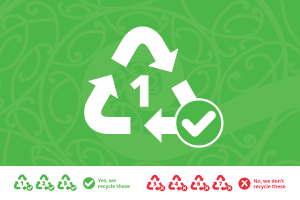 Put these items into your Council Green Recycling Wheelie Bin. They are sorted at the Awapuni Resource Recovery Centre and then recycled in NZ.
Put these items into your Council Green Recycling Wheelie Bin. They are sorted at the Awapuni Resource Recovery Centre and then recycled in NZ.
- Fruit and vege punnets,
- soft drink and water bottles,
- harder plastic containers that hold peanut butter and mayonnaise.
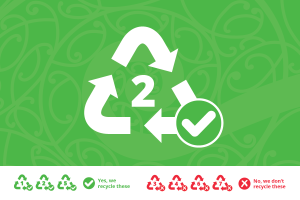 Put these items into your Council Green Recycling Wheelie Bin. They are sorted at the Awapuni Resource Recovery Centre and then recycled in Palmerston North.
Put these items into your Council Green Recycling Wheelie Bin. They are sorted at the Awapuni Resource Recovery Centre and then recycled in Palmerston North.
- Milk bottles
- Juice bottles
- Shampoo and cleaning bottles
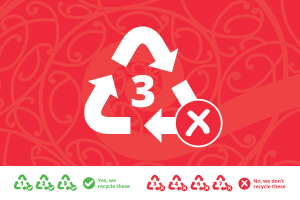 Put these items in to your rubbish bag. We can't recycle plastic with this number and won't be collecting it from Monday 31 May 2021.
Put these items in to your rubbish bag. We can't recycle plastic with this number and won't be collecting it from Monday 31 May 2021.
- Clear trays for holding food or takeaways,
- some large containers with sturdy handles,
- a number of plastic containers used for storing or packaging things like batteries or electronics.
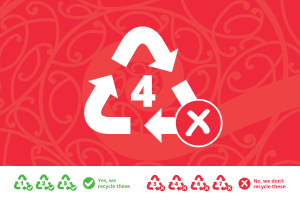 Put these items in to your rubbish bag. We can't recycle plastic with this number and won't be collecting it from Monday 31 May 2021.
Put these items in to your rubbish bag. We can't recycle plastic with this number and won't be collecting it from Monday 31 May 2021.
- some meat trays and takeaway containers
- single use plastic bags
- bubble wrap
- plastic wrap.
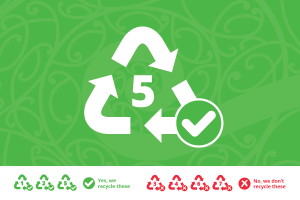 Put these items into your Council Green Recycling Wheelie Bin. They are sorted at the Awapuni Resource Recovery Centre and then recycled in Palmerston North.
Put these items into your Council Green Recycling Wheelie Bin. They are sorted at the Awapuni Resource Recovery Centre and then recycled in Palmerston North.
- some takeaway containers
- plastic cutlery
- 2l ice cream containers
- large yoghurt containers.
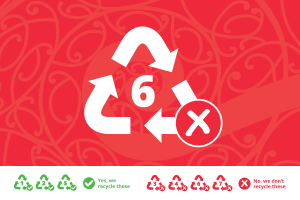 Put these items in to your rubbish bag. We can't recycle plastic with this number and won't be collecting it from Monday 31 May 2021.
Put these items in to your rubbish bag. We can't recycle plastic with this number and won't be collecting it from Monday 31 May 2021.
- 6pk yoghurt pottles
- some meat trays
- foam cups
- protective packaging.
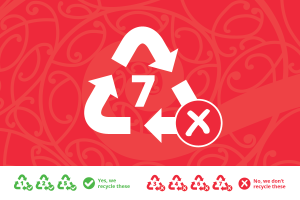 This is a mix of different plastics, including BPA, polycarbonate, acrylic, nylon, polylactic fibres and fibreglass. Put these items in to your rubbish bag. We can't recycle plastic with this number and won't be collecting it from Monday 31 May 2021.
This is a mix of different plastics, including BPA, polycarbonate, acrylic, nylon, polylactic fibres and fibreglass. Put these items in to your rubbish bag. We can't recycle plastic with this number and won't be collecting it from Monday 31 May 2021.
- baby bottles and sippy cups
- CDs
- plastic toys
- packaging for some food and electronics.